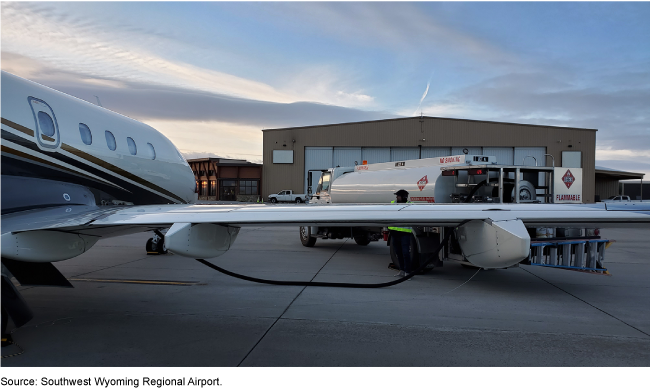Aviation Services: Information on Airports Exercising Their Right as the Sole Provider of Fuel
Fast Facts
To be eligible for federal airport improvement grants, U.S. airports are not allowed to grant exclusive rights to any one company to provide aviation services—such as fuel—to the public. However, an airport may choose to be the exclusive provider of aviation services as long as they use their own employees and resources.
How many airports are exercising the right to be the sole fuel provider?
We surveyed 3,010 airports within the contiguous United States. Of those, 588 said that they are the exclusive provider of fuel service at their airport (primarily as a way to generate revenue from fuel sales).
Aircraft and Fuel Truck

Highlights
What GAO Found
Based on GAO's survey, 588 of the nearly 2,000 airports responding to the survey reported exercising their proprietary exclusive right (the right to be the sole service provider) for aviation fuel services. While airports are generally prohibited from granting an exclusive right to any party to provide aviation services, the Federal Aviation Administration (FAA) has determined that an airport can be the exclusive provider of such services, thereby precluding other parties from providing those services at the airport. Most (567) of these airports are general aviation airports—airports that have no scheduled commercial service or have scheduled service but fewer than 2,500 passenger boardings per year. The 588 airports are located in 45 of the 48 contiguous states and in all of the FAA regions covering these states.
Location of Airports that Reported Using the Proprietary Exclusive Right on GAO Survey, by Federal Aviation Administration Region

Note: An airport sponsor may elect to provide any or all of the aeronautical services at its airports and be the exclusive provider of those services. This is known as the proprietary exclusive right.
GAO's survey and interviews with selected airports found most airports that report exercising their proprietary exclusive right do so based largely on attracting users to the airport, providing a high level of reliable customer service, and generating airport revenue. Over 90 percent of the 588 airports responded that attracting users to the airport and generating revenue were very important or somewhat important to their decision to provide fuel service. Further, officials from 17 of the 26 airports GAO interviewed explained that the resulting revenue was a main factor in their decision to provide fuel service. For example, one airport manager said the revenue allows the airport to invest in capital projects, such as building hangars, to help attract users to the airport. The revenue can also help an airport become as financially self-sustaining as possible, which is a requirement to receive federal airport grants. Airports also cited providing consistent customer service as a key factor in exercising their proprietary exclusive right. For example, one airport manager GAO spoke to said complaints about the former private fuel provider's customer service and prices prompted the airport to become the sole service provider.
Why GAO Did This Study
FAA, through federal airport grants, helps fund airports' capital development and is responsible for overseeing airports' compliance with federal requirements incorporated in airport grant agreements. Under these agreements, airports are generally not allowed to grant exclusive rights to any person or entity to provide aeronautical services—such as fuel—on airport grounds. FAA has determined, however, that airports themselves can opt to be the exclusive provider of such services by exercising their proprietary exclusive right.
The FAA Reauthorization Act of 2018 included a provision for GAO to examine airports that have exercised their proprietary exclusive right. This report addresses what is known about the number and characteristics of airports that are currently exercising their proprietary exclusive right to provide fuel and the factors airports consider when deciding whether to exercise this right to provide fuel.
GAO reviewed relevant federal statutes, FAA policies and guidance, airport documents and websites, and conducted a web survey of all 3,010 public use airports in the contiguous United States. GAO interviewed officials at a non-generalizable sample of 26 airports that self-identified as exercising their proprietary exclusive right and at 10 airports that are not exercising their proprietary exclusive right, selected based on a mix of characteristics, including the amount of fuel sales. GAO also interviewed FAA compliance staff at headquarters and regional offices.
For more information, contact Heather Krause at (202) 512-2834 or krauseh@gao.gov.
